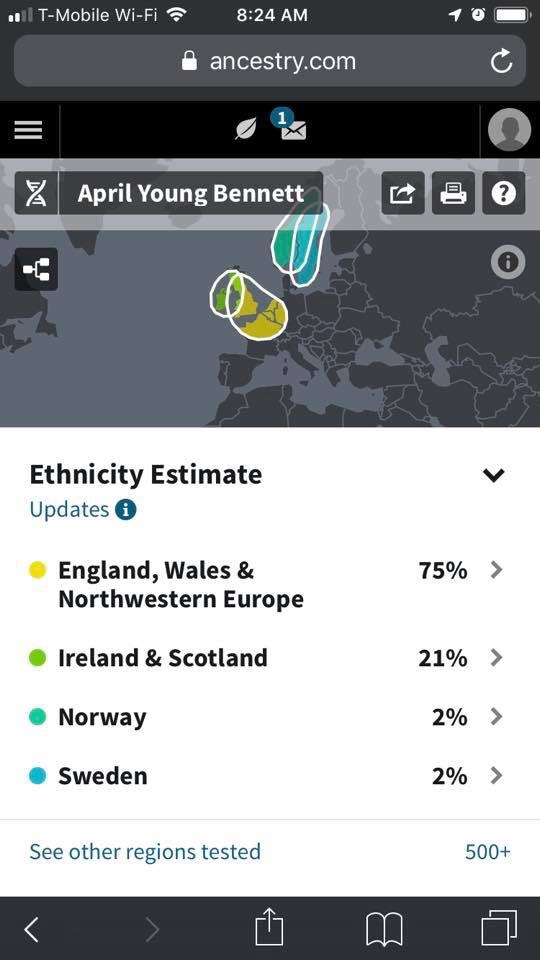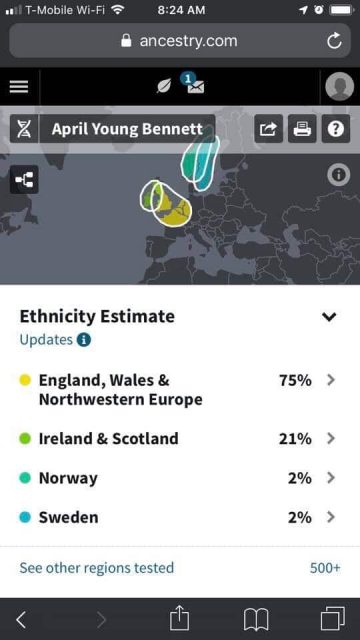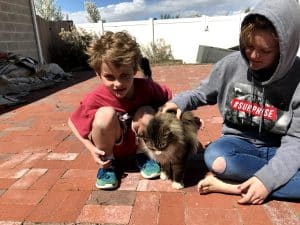There was a new face at my step-grandmother’s funeral—another Nordic face, like my step-grandma and her children and grandchildren. He had never met my step-grandmother, but in the few days after her death and before her funeral, he had taken a DNA test through one of those testing websites and discovered the identity of his biological father. His father was one of my step-Grandma’s sons, who had dated the young man’s mother about two decades before. He was just in time to learn all about his biological grandmother by attending her funeral, although, unfortunately, just too late to actually meet her. The family flocked around this charming young man and the big, playful dog he brought with him to the family picnic after the funeral, thrilled to bring this unexpected new cousin into the fold.
Last summer, I met another stranger at a family reunion of another branch of my big family tree. This older man had also found us through DNA testing. The story uncovered by the DNA was a bit messier this go-around; his father was the family patriarch, my husband’s grandpa, who had been married to my husband’s grandma at the time this man was conceived. Did she know that he had cheated on her? Did he know that his infidelity resulted in a son? We can never know what they knew; they are long since deceased. “Ask your parents all your questions while they are alive,” one of my husband’s aunts told me with a shrug. The backstory may have been awkward, but family is a gift, and most of my husband’s aunts and uncles embraced their newly discovered biological half-brother.
I attended another family reunion last summer, for another branch of in-laws. There were no newly uncovered relatives present at this one. Several of them had taken DNA tests, and unsurprisingly, the app had grouped them together as biological relatives. But there was one extra person included in the mix, a profile for someone they hadn’t met who identified himself as an adoptee. They mulled over theories about how this one stranger was connected to their family and debated whether they should reach out to him. They weren’t sure if they should give him information that could lead to uncovering the identity of the man’s mother, who had apparently chosen to remain anonymous through a closed adoption.

Shortly after that reunion, I had my own DNA tested. The results were boring to the extreme. I learned that my ancestors were homogeneous white people who spoke English (one Viking invader excepted). In equally boring but reassuring news, the biological relatives identified for me by the app were the family I had always known. No surprises.
Yet.






5 Responses
Yet. I love it. 🙂
From what you posted not all your ancestors were English speaking. Not too long ago those from Ireland would have spoken Irish Gaelic and those from Scotland Scottish Gaelic. If you have any from Wales then they would have spoken Welsh. English has taken over those areas more recently than you would think. There is still the Gaeltacht in Ireland. Celtic languages are really interesting. They are very different from Germanic or Romantic languages. You should take a look at them they are not boring.
Wow! that is pretty amazing! I want to do one of those tests. The funny thing is my husband I have found out that we are actually distant cousins. He has a long line of Mormon ancestors and I am a convert. He grew up on the west coast (US) and I am from the east (US). Small world, I guess.
I have a half brother I never about it until 18 months ago after my sister took a DNA test. He turns 50 this summer. It was shocking finding this out and my mother will NOT talk about it so it’s this weird elephant in the room. My siblings and I have all reached out to him and are trying to create a bond, but again the fact that my mother, his birth mom, won’t engage adds to the awkwardness.
My father was unfaithful for many, many years. Several times, I saw him gazing so lovingly and affectionately at his mistress’s family photo that I wondered if one or two of those children were actually his. DNA testing was not yet available and it is something I choose not to do for this very reason. My father’s ill treatment of my mother was bad enough without bringing a half-sibling into it. That half-sibling grew up in a family where he or she believed they belonged.
I have a friend who was adopted and we know enough about the situation to know it was rape and to know her mother was not the only victim. The records were sealed. She now has the opportunity to find out the truth about her parentage and she’s not sure she wants to do it. Personally, I think that rapist should be identified, if he’s still living.
DNA testing is a double-edged sword and I know it has caused rifts in quite a few families. I know that, overall, it has not been as hot of a product as family history companies were thinking it would be and this is the reason why. Personally, I think the technology and how it can reveal the movements and massive amounts of people around the globe is very exciting. I do think, though, that a certain amount of care for the people involved needs to be a factor in obtaining these tests.